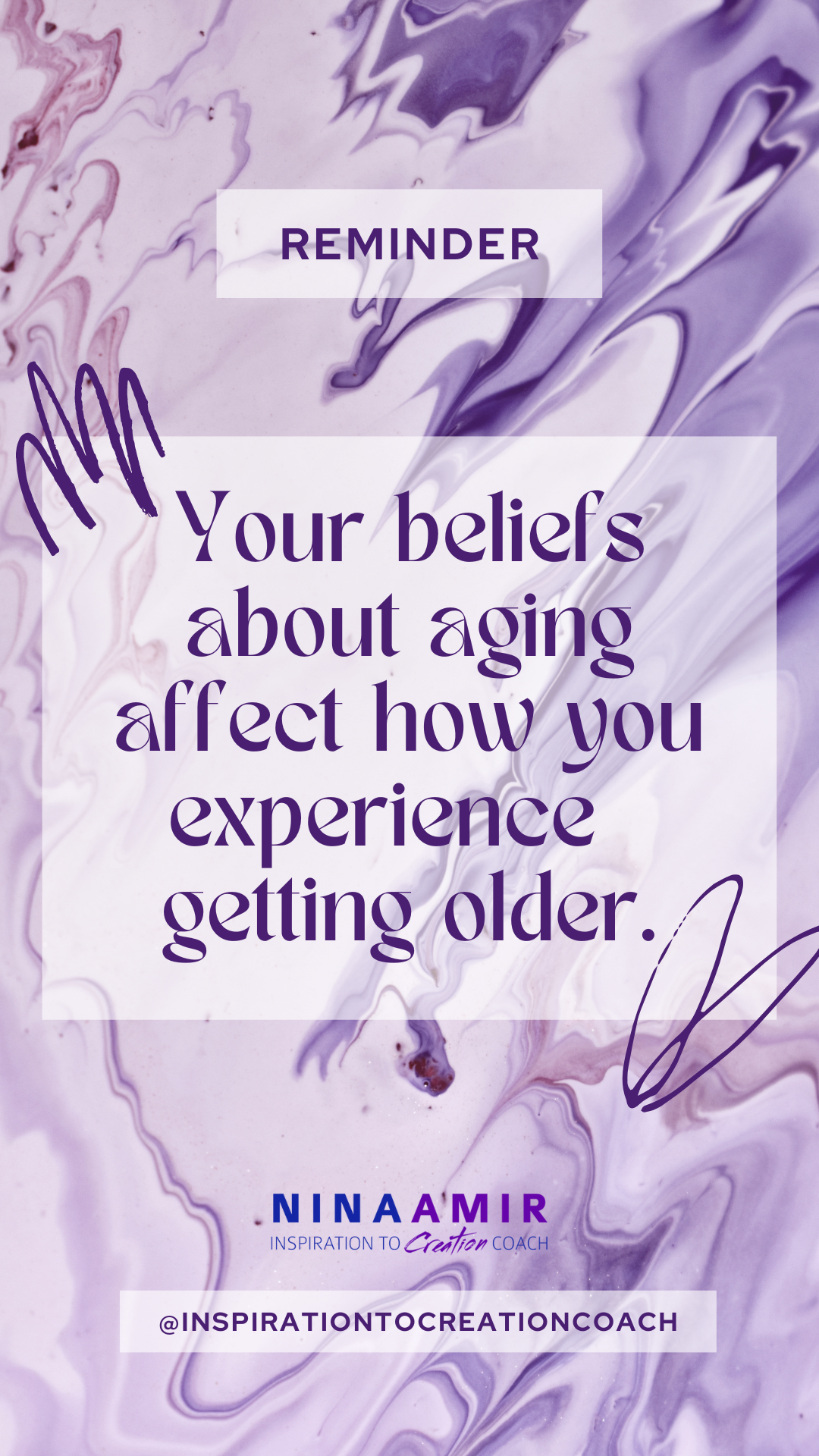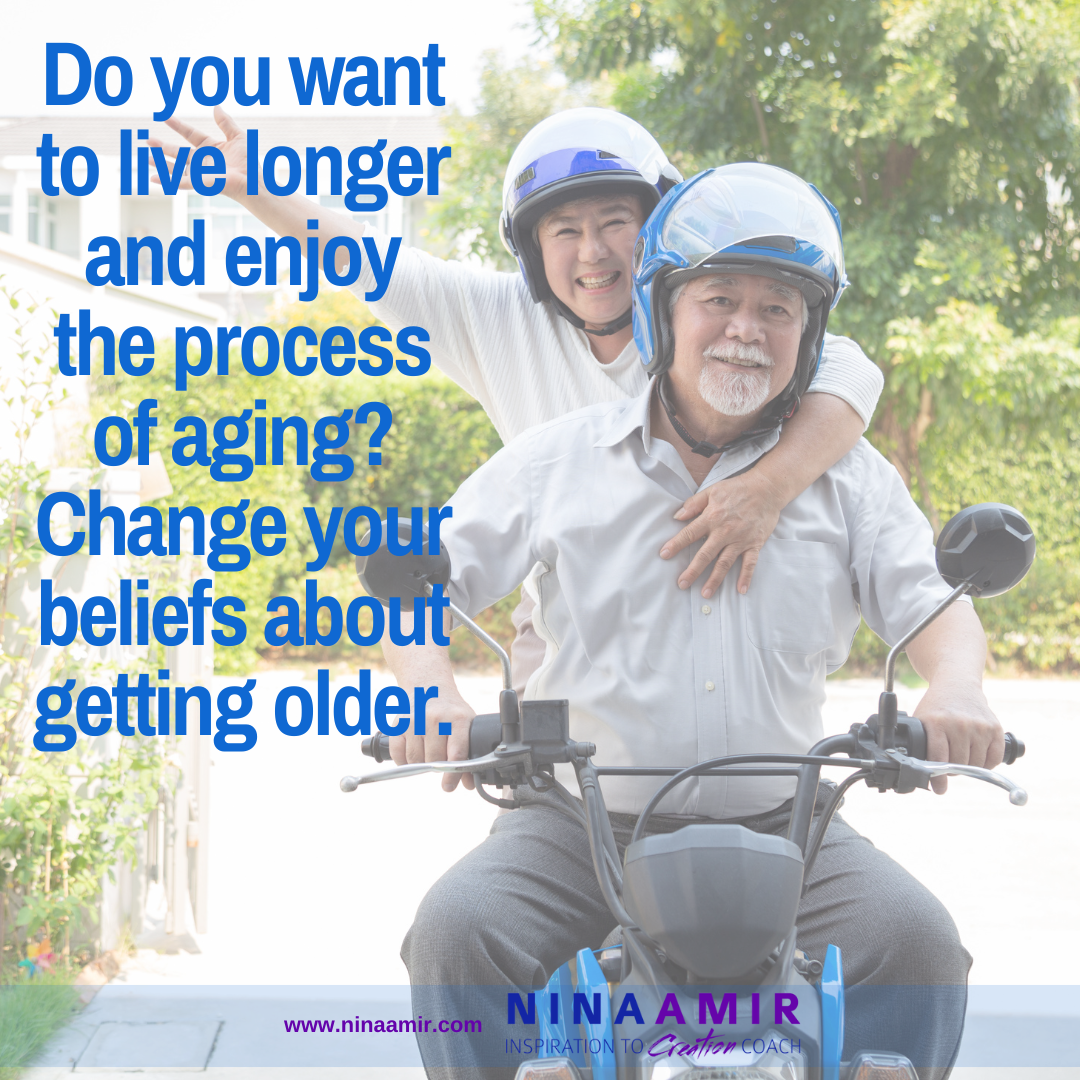Yesterday would have been my mother’s 99th birthday. Unfortunately, she died a few months ago at age 98. She never imagined she’d live that long (nor did she want to do so), but she had some ingrained beliefs about health and aging as well as about what she needed to do to stay healthy and live longer.
Her longevity makes me wonder about the length of my life. If I live as long as her…or longer, I have about another 35 years to make the best of my time on Earth.
And that’s what I intend to do! I do not want to have regrets when I die.
Now, on the other hand, my father died at 45. So, I could just as easily have a shorter life span. Yet, I’ve outlived him by more than 20 years already.
When you reach 50 or 60, It’s easy to think your life is almost over. But that’s an invalid belief. You have passed the halfway point of life expectancy but likely still have many years to live.
People Live Longer
If you don’t believe me, look at the statistics, and you’ll realize people are living longer:
- The U.S. Census Bureau reports that more than 56 million adults ages 65 and older live in the United States, accounting for about 16.9% of the nation’s population.
- The Society of Actuaries claims a today 65-year-old male today in average health has a 55% probability of living to age 85. A 65-year-old woman in average health has a 65% chance of reaching 85.
- There were 89,739 centenarians, or people 100 or older, living in the United States in 2021, nearly twice as many as there were 20 years prior, according to data from the Population Division of the United Nations.
- In November 2022, one in 5,000 people in the U.S. were centenarians, according to Dr. Thomas Perls, professor of medicine at Boston University Chobanian & Avedisian School of Medicine and director of the university’s New England Centenarian Study.
If you are curious about how long you’ll live, you might try Perls’ longevity calculator, but think carefully before you do!
Your longevity calculator result will place a thought in your head that you only have “X” number of years left to live. (“X” = your longevity calculator result.) And that thought quickly can become a belief, which has the power to impact your longevity. For instance, if you discover you may only live another five years and choose to believe that, that belief could very well become your reality.
For that reason, I did not use the calculator. I didn’t want to entertain the thought that I could die sooner than I would like. Instead, I want to believe I have many years ahead.
The Mind-Body Connection
Don’t discount the power of your belief about how long you’ll live. Believe you will live longer, and there is a higher likelihood of that being the case. Believe the opposite, and that could be your reality.
In her book, Breaking the Age Code: How Your Beliefs About Aging Determine How Long and Well You Live, Dr. Becca Levy, an award-winning Yale professor of psychology and global health, makes a powerful mind-body connection between belief and longevity. She demonstrates that improving age beliefs benefits all aspects of the aging process, including how genes operate. This can result in the extension of life expectancy by 7.5 years. She also demonstrates that many health problems formerly considered entirely due to aging, such as memory loss, hearing decline, and cardiovascular events, are instead influenced by the negative age beliefs dominant in the U.S. and other ageist countries.
Beliefs and Aging
Beliefs are powerful and impact every aspect of our lives. So why wouldn’t they affect aging, too? No reason.
You form beliefs about aging starting in childhood. Additionally, they are shaped by the messages you receive from culture, family, and friends. Then, your beliefs shape your perceptions and attitudes towards aging and how it impacts emotional, mental, and physical health.
For many years, society has held negative beliefs about aging. These include the idea that aging is accompanied by decline, resulting in loss of control, independence, and, ultimately, adverse health outcomes. Unfortunately, you can see such beliefs widely accepted and reinforced through media and advertising, not to mention celebrities who invest vast amounts of money in ensuring they remain looking young.
However, positive beliefs focused on personal growth, wisdom, fulfillment, well-being, and happiness later in life can result in more positive aging experiences. In fact, those who believe they are getting better with age experience that reality.
Beliefs Impact Your Physical, emotional, and Mental Health
Let’s look specifically at how your beliefs about aging impact your physical health, including cognitive functions and body ailments.
Studies have shown that negative beliefs about aging can affect memory, balance, and immune function. In contrast, positive thoughts can contribute to resilience and better cognitive function.
Here’s the thing: People holding positive beliefs about aging are more likely to engage in healthy behaviors, such as regular exercise, healthy diets, and preventive health care. Thus, their beliefs lead to actions that help them live longer.
Moreover, positive aging beliefs lower the likelihood of developing chronic ailments like cardiovascular disease and diabetes.
Your beliefs about aging also impact your emotional and mental health. For example, research proves that negative beliefs contribute to negative attitudes about aging. This can increase your risk of depression, loneliness, social isolation, and anxiety. In contrast, positive beliefs about aging are linked to higher self-esteem, greater life satisfaction, and improved resilience.
Changing Your Negative Beliefs about Aging
You must change your negative beliefs about aging into positive ones to age well and live a long life. This, however, often requires effort since negative thoughts can be deeply ingrained.
 So, how do you begin changing your ageist beliefs? First, identify them. List all the things you believe about getting older (or old). You might be surprised at what you think about this process and stage of life.
So, how do you begin changing your ageist beliefs? First, identify them. List all the things you believe about getting older (or old). You might be surprised at what you think about this process and stage of life.
Second, challenge those beliefs. You can do so based on facts or studies. (Stay away from assumptions and interpretations.) Or look for positive role models, such as those you know who are in their 70s, 80s, 90s, or even older and still doing the things they love, experiencing good health, or enjoying life.
Third, consider what you want the aging process and the “old-age period” of life to be like. If you could wave a magic wand, what would your later years in life look, feel, and be like?
Now, list statements or affirmations related to this vision. Repeat them to yourself often to create new positive beliefs about aging.
And don’t forget to spend time visualizing your magic-wand scenario. Doing so increases the potential for having that same experience of aging.
Your Age-Related Identity
A fourth way to change any ageist beliefs is to alter your age-related identity. In other words, decide who you will be now or in the future as that identity relates to aging.
Who do you want to be as you age? Someone who has trouble walking, loses mental acuity, and believes life gets more challenging as they age? Or do you want to be someone who is flexible and strong, mentally sharp, and wakes up every day grateful for another chance to live fully?
Obviously, “being” the first type of person—adopting that identity—comes with a set of ageist beliefs. The second type of person with a positive outlook on aging has positive beliefs about getting older.
By being someone who has a positive mindset about aging, you increase the likelihood of having a healthier body and mind as you get older. That seems like a pretty good reason to adopt that identity.
Don’t Underestimate the Power of Your Beliefs
The impact of your beliefs on aging should not be underestimated. Negative thoughts can lead to physical, mental, and emotional challenges. At the same time, positive beliefs can help prevent them and enhance your well-being as you age.
Plus, when you adopt positive beliefs and debunk negative ones about aging, you take control of the process to the greatest extent possible. You stand in your power and create a happier, more fulfilling aging experience.
Whether in so-called “middle age” or older, you can choose what to believe about aging. You can even decide to believe you have many more years to enjoy. And that set of beliefs will determine to a great extent your experience in the coming years.
Do you have a positive or negative belief system around aging? Tell me in a comment below. And please share this post with a friend or on social media.
If you want to activate your 10 human drives so you nourish your soul consistently, let’s chat. Get on my calendar here. Or join the Inspired Creator Community for group transformational coaching every month. (In March 2023, we begin a new series related to the human drives.)
 It’s time to transform, is it not? Join the Inspired Creator Community. You probably already realize that you need to change from the inside out. That’s how you become a person who does the things that allow you to create your desires. As a member, you get access to intuitive transformational coaching, world-class personal growth coaching, and strategies for living a life that feeds your soul. And you will discover that you are a powerful creator able to create what you want (not what you don’t want). Join now!
It’s time to transform, is it not? Join the Inspired Creator Community. You probably already realize that you need to change from the inside out. That’s how you become a person who does the things that allow you to create your desires. As a member, you get access to intuitive transformational coaching, world-class personal growth coaching, and strategies for living a life that feeds your soul. And you will discover that you are a powerful creator able to create what you want (not what you don’t want). Join now!Photo courtesy of:RODNEProductions



